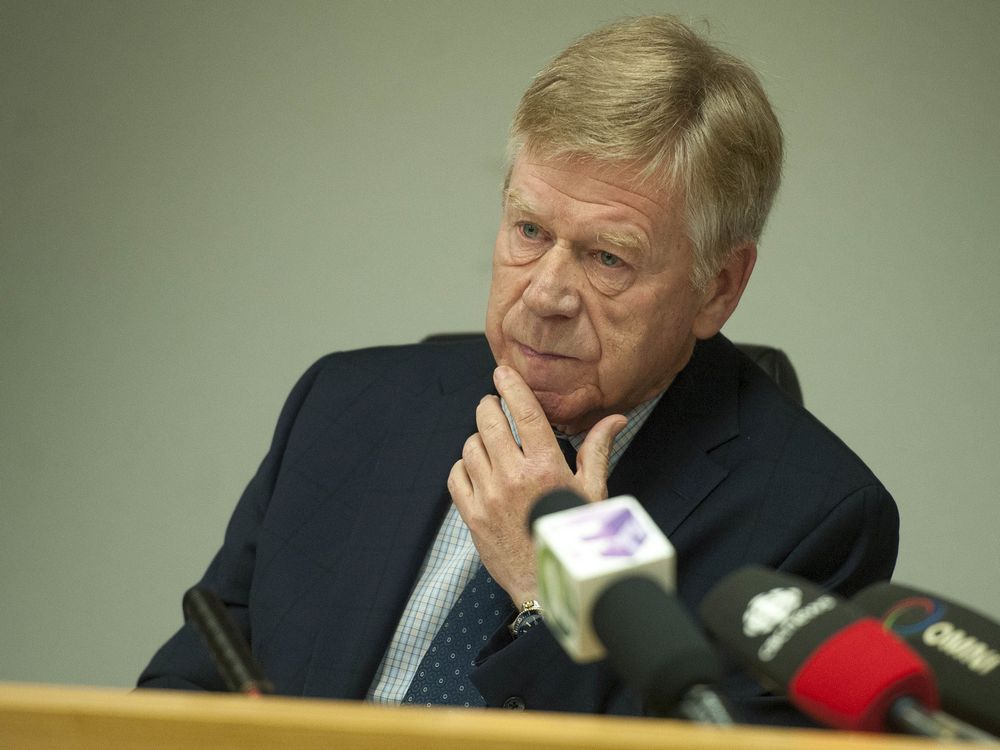Vaughn Palmer: Inquiry for coming clean on money laundering has limits, challenges

Credit to Author: Gord Kurenoff| Date: Thu, 07 Nov 2019 23:57:05 +0000
VICTORIA — When the money-laundering inquiry held a public meeting in the provincial capital this week, commissioner Austin Cullen opened with some cautionary remarks about what his mandate does and does not entail.
One bears repeating, in light of over-the-top expectations in some quarters that the commission will be identifying perpetrators of the crime of money laundering and then meting out the appropriate punishment.
“It is important to be aware that the powers of the commission are set out in the Public Inquiry Act which does not permit me to make findings of criminal guilt or civil liability, or to impose punishment or award any kind of remedy,” said Cullen in addressing the three dozen or so members of the public gathered in the ballroom of a downtown Victoria hotel Monday night.
Rather, “the terms of reference specifically require me to forward any information obtained during the inquiry that may be useful in the investigation or prosecution of a criminal offence to the appropriate authorities,” said the B.C. Supreme Court Justice.
So in terms of the prospects for crime and punishment: maybe, maybe not, and in any event, not likely within the remaining 18 months’ time frame for the inquiry, which is obliged by the NDP government to deliver a final report in May 2021.
Cullen also had this to say about the limitations imposed on the inquiry by the cabinet-authored terms of reference: “In a previous meeting, we heard some presenters speak about issues of legitimate concern to them, but which did not fall within our mandate.
“I encourage those of you presenting this evening to ensure that your remarks align with our mandate which is money laundering in the province of British Columbia.”
The aforementioned previous meeting is the one held in Vancouver last month, reported on by The Vancouver Sun’s Ian Mulgrew in a piece headlined “Hearing brings out conspiracy theorists.”
Several of the participants threatened to turn the proceedings into a crackpot free-for-all, “one complaining about foreign mothers bearing children in Richmond, another about having a mile-high skyscraper rejected by crooked politicians, and a martial-arts-trained poker player pleading for protection,” as Mulgrew put it.
There was much less of that at the Victoria meeting, perhaps because of pre-screening by commission staff, perhaps because those in attendance took the hint from the commissioner himself.
One woman did provide a beside-the-point account of how her brother had wrested away control of the family home from her dementia-ridden mother and was now threatening to call the cops every time she (the daughter not the mother) tried to intervene.
But there was also one to-the-point complaint that captured the legitimate public concern about the impact of money laundering on the real estate market.
The woman said she had worked hard all her life and her children were doing the same. Yet they couldn’t afford to buy homes where they lived, in Victoria.
By way of explanation she offered this plausible equation: Money laundering drives up prices in Vancouver. Vancouverites cash in and move to Victoria, distorting the market here as well. “My kids can’t compete with that.”
The commission also heard from a former federal Liberal MP who served as parliamentary secretary to Finance Minister Paul Martin back in the 1990s when Ottawa enacted the country’s current proceeds of crime legislation.
He’s Roy Cullen, no relation to commissioner Cullen. Far from posing as an apologist for the federal effort, the former MP readily identified shortcomings in the reporting and enforcement regime.
The law requires financial institutions, casinos, realtors and others to report suspiciously large cash transactions to Fintrac, the federal overseer agency.
But he says Fintrac should periodically audit those entities to be sure they are reporting truthfully. Plus he believes that neither Fintrac nor the RCMP have the resources to thoroughly investigate all of the dubious transactions that are reported.
One of the most sobering parts of the former MP’s presentation involved his account of what happened to the federal effort to apply the cash-reporting requirement to the country’s law firms. The lawyers challenged it and the courts agreed, voiding that part of the legislation.
As a result said Cullen, there is nothing (other than personal qualms) to stop lawyers from accepting suitcases full of cash, no questions asked.
Commissioner Cullen could do worse than call former MP Cullen as an expert witness at the formal public hearing part of the inquiry, scheduled to start next year.
But while ex-MP Cullen and others have volunteered their observations and insights, commission staffers have also begun vetting individuals who are concerned to remain anonymous in providing information.
At a recent public meeting in Kelowna, a man who identified himself as “a former RCMP officer with experience in working with organized crime” cautioned that “people wanted to speak but were afraid to do so out of concern for their safety.” He further indicated “that the presence of cameras may dissuade people from sharing their concerns.”
Commission counsel Patrick McGowan responded with assurances that reluctant individuals could share concerns in confidence and in writing “through the commission website” or directly, in person, with him or others on the staff.
The commission is also ready to provide additional cover to would-be whistleblowers by directly subpoenaing them as witnesses. That way they can say they had no choice but to testify under oath when the formal public hearings commence in the inevitable glare of publicity.
CLICK HERE to report a typo.
Is there more to this story? We’d like to hear from you about this or any other stories you think we should know about. Email vantips@postmedia.com